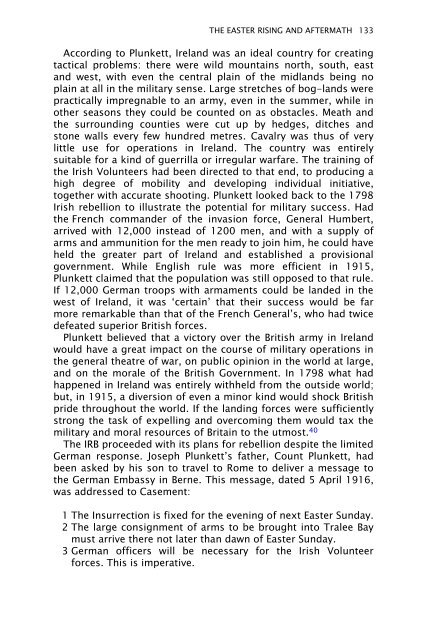Dividing Ireland: World War I and Partition
Dividing Ireland: World War I and Partition
Dividing Ireland: World War I and Partition
You also want an ePaper? Increase the reach of your titles
YUMPU automatically turns print PDFs into web optimized ePapers that Google loves.
THE EASTER RISING AND AFTERMATH 133<br />
According to Plunkett, <strong>Irel<strong>and</strong></strong> was an ideal country for creating<br />
tactical problems: there were wild mountains north, south, east<br />
<strong>and</strong> west, with even the central plain of the midl<strong>and</strong>s being no<br />
plain at all in the military sense. Large stretches of bog-l<strong>and</strong>s were<br />
practically impregnable to an army, even in the summer, while in<br />
other seasons they could be counted on as obstacles. Meath <strong>and</strong><br />
the surrounding counties were cut up by hedges, ditches <strong>and</strong><br />
stone walls every few hundred metres. Cavalry was thus of very<br />
little use for operations in <strong>Irel<strong>and</strong></strong>. The country was entirely<br />
suitable for a kind of guerrilla or irregular warfare. The training of<br />
the Irish Volunteers had been directed to that end, to producing a<br />
high degree of mobility <strong>and</strong> developing individual initiative,<br />
together with accurate shooting. Plunkett looked back to the 1798<br />
Irish rebellion to illustrate the potential for military success. Had<br />
the French comm<strong>and</strong>er of the invasion force, General Humbert,<br />
arrived with 12,000 instead of 1200 men, <strong>and</strong> with a supply of<br />
arms <strong>and</strong> ammunition for the men ready to join him, he could have<br />
held the greater part of <strong>Irel<strong>and</strong></strong> <strong>and</strong> established a provisional<br />
government. While English rule was more efficient in 1915,<br />
Plunkett claimed that the population was still opposed to that rule.<br />
If 12,000 German troops with armaments could be l<strong>and</strong>ed in the<br />
west of <strong>Irel<strong>and</strong></strong>, it was ‘certain’ that their success would be far<br />
more remarkable than that of the French General’s, who had twice<br />
defeated superior British forces.<br />
Plunkett believed that a victory over the British army in <strong>Irel<strong>and</strong></strong><br />
would have a great impact on the course of military operations in<br />
the general theatre of war, on public opinion in the world at large,<br />
<strong>and</strong> on the morale of the British Government. In 1798 what had<br />
happened in <strong>Irel<strong>and</strong></strong> was entirely withheld from the outside world;<br />
but, in 1915, a diversion of even a minor kind would shock British<br />
pride throughout the world. If the l<strong>and</strong>ing forces were sufficiently<br />
strong the task of expelling <strong>and</strong> overcoming them would tax the<br />
military <strong>and</strong> moral resources of Britain to the utmost. 40<br />
The IRB proceeded with its plans for rebellion despite the limited<br />
German response. Joseph Plunkett’s father, Count Plunkett, had<br />
been asked by his son to travel to Rome to deliver a message to<br />
the German Embassy in Berne. This message, dated 5 April 1916,<br />
was addressed to Casement:<br />
1 The Insurrection is fixed for the evening of next Easter Sunday.<br />
2 The large consignment of arms to be brought into Tralee Bay<br />
must arrive there not later than dawn of Easter Sunday.<br />
3 German officers will be necessary for the Irish Volunteer<br />
forces. This is imperative.








